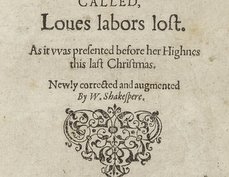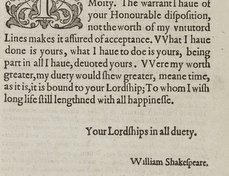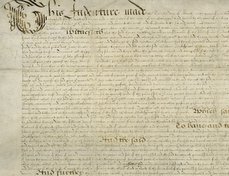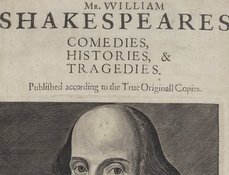From the collections of: THE BRITISH LIBRARY
Terms of use
The British Library has graciously contributed the above images to Shakespeare Documented under a Creative Commons Public Domain Mark.
Copyright status of the manuscript and unpublished Materials: The 1988 Copyright, Designs and Patents Act (as amended) states that unpublished literary and artistic works remain in copyright in the UK until at least 31 December 2039. Therefore important parts of the library’s collection remain in copyright, including very old manuscripts. However for unpublished material created many centuries ago and in the public domain in most other countries, the Library believes this material to be very unlikely to offend anyone. As an institution whose role it is to support access to knowledge, we have therefore taken the decision to release certain digitised images technically still in copyright in the UK under the Public Domain Mark.
Document-specific information
Title: Four slips of paper used as bookmarks, said to be taken from a German book of about 1620. The first three consist of fragments from a letter, the last contains a dozen Shakespearian quotations, of one to two lines each, from Pericles and Richard I[II]
Date: ca. 1620
Repository: The British Library, London, UK
Call number and opening: Add. MS 41063 K, fol. 87r
View online bibliographic record
Laura Estill, "Manuscript extracts from Pericles and Richard III included on a slip of paper," Shakespeare Documented, https://doi.org/10.37078/811.
The British Library, Add. MS 41063 K, fol. 87r. See Shakespeare Documented, https://doi.org/10.37078/811.
This scrap of paper, subsequently used as a bookmark, includes eight Shakespeare quotations from Richard III and Pericles. Based on the style of handwriting, the source texts, and the date of publication of the book in which it was found, it was likely copied sometime after 1620. On June 6, 1923, John Norman Collie, Head of the Organic Chemistry Department of University College London, wrote to A. W. Pollard, the Shakespearean and bibliographer, to describe its discovery:
I found [the bookmark] together with the enclosed slips in an old folio (German) that I think was published about 1620. I am not certain of the date because the folio was lent to Prof. W. P. Ker, and he has lost it! I don’t know how he managed to do so, for the folio was very bulky. The piece of paper with the quotations and the slips evidently had been used as book markers.
Collie’s letter is now bound with the bookmark and other miscellaneous materials—including a nineteenth-century song, a letter by Frederick II of Prussia, and a photograph of a page missing from John Milton’s commonplace book—as British Library Add. MS 41063 K.
The bookmark is a duodecimo sized slip of paper written in secretary hand. Written at the top of the page, with room below to add further material, are eight extracts from Richard III (5.2.24-5; 1.1.164; 1.3.258; 1.3.303-4; 2.4.14-5; 3.1.80; 3.1.95; 3.7.52) and three extracts from Pericles act 2, scene 3 (2.3.27; 2.3.40; 2.3.72-3). Stanley Wells and Gary Taylor suggest that the Pericles extracts were copied from the 1619 fourth quarto. The selections from Richard III were taken from one of the play quartos (not the collected plays of Shakespeare published in folio). The manuscript reads, “play the mayds part, say noe, and take it” (3.7.52), as do all quarto versions, whereas in the folio, the line runs “still answer nay, and take it.”
The early reader who copied the Shakespeare extracts may also have been the same reader who began reading the unidentified German folio mentioned in Collie’s letter and tucked the slip of paper in as a bookmark. Indeed, it is because this paper was slid into a bound volume that it survived.
The extracts on this scrap are commonplaces; that is, sententiae or short sayings that convey proverbial wisdom. The line, “Soe wise soe young, they say never live long” (Richard III 3.1.80) is an example of a commonplace. Early readers copied commonplaces from drama and poetry by Shakespeare and his contemporaries for future reference, edification, and sharing among friends.
Transcriptions of the manuscript excerpts are also available on DEx: A Database of Dramatic Extracts.
Written by Laura Estill
Sources Consulted
Beal, Peter, comp. Catalogue of English Literary Manuscripts. http://www.celm-ms.org.uk/
Estill, Laura. “Commonplacing Readers.” Shakespeare and Textual Studies. Ed. Margaret Jane Kidnie and Sonia Massai. Cambridge: Cambridge UP, 2015. 149-62.
-----. Dramatic Extracts in Seventeenth-Century English Manuscripts: Watching, Reading, Changing Plays. Newark, DE: U of Delaware P, 2015.
----, ed. DEx: A Database of Dramatic Extracts. Forthcoming, online.
Wells, Stanley, and Gary Taylor. William Shakespeare: A Textual Companion. Oxford: Oxford University Press, 1987.
Last updated June 10, 2020










